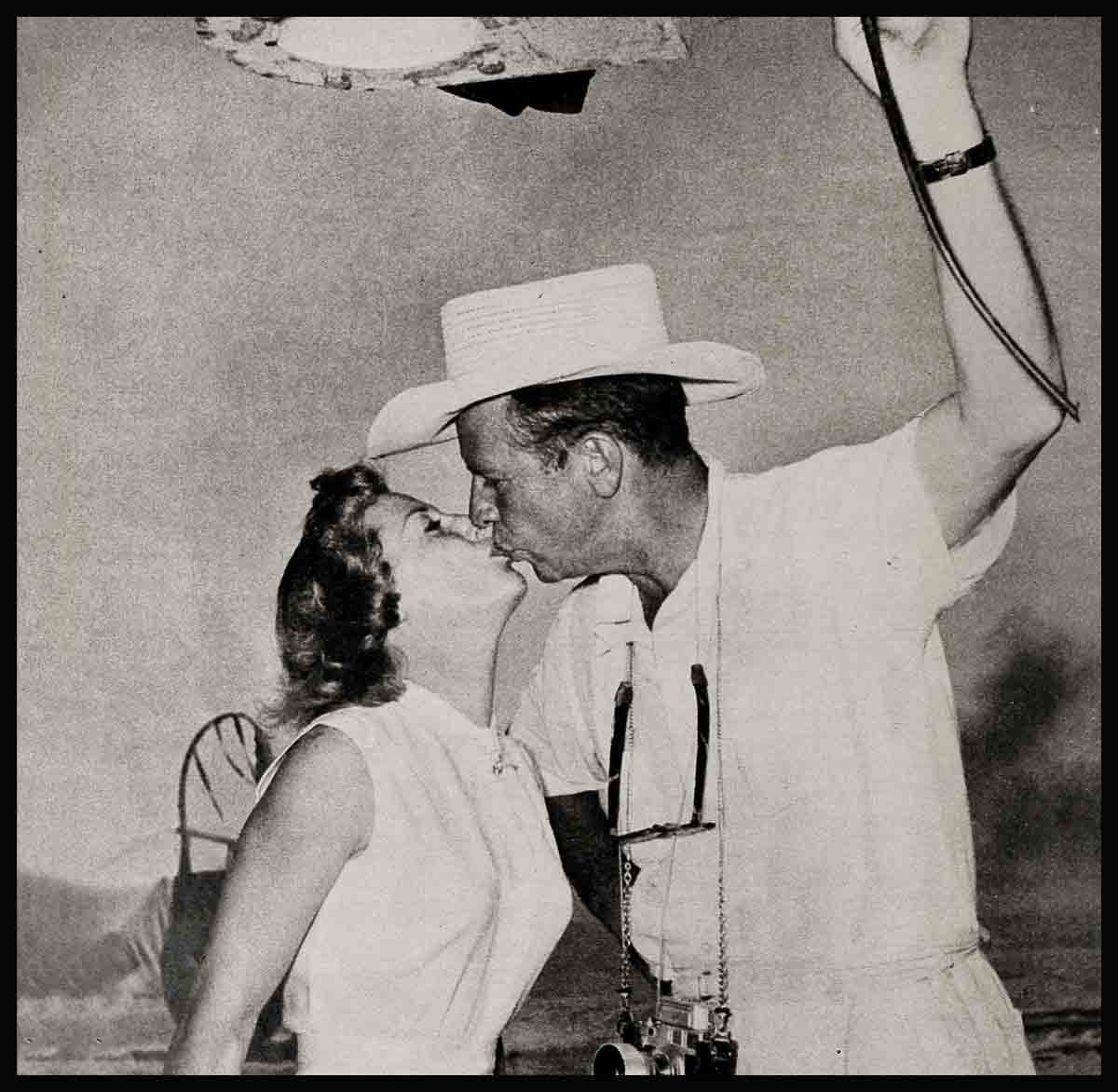
Little Things Mean A Lot—June Allyson & Dick Powell
When June Allyson told some of her friends that she was going to St. George, Utah, “to be on location with Richard while he directs The Conqueror,” they told her she was making a mistake.
“Look,” one of them said, “you’ve just finished Strategic Air Command. You’ve been knocking yourself out in Ft. Worth and St. Petersburg and New Orleans. You’re dead tired.
“St. George is a nice little town, but in the summer the mercury shoots up to about 130 degrees. It’s no place to go for a rest, Junie.”
Mrs. Richard Powell cocked her cute little head to one side.
“I’m not going to St. George,” she announced in that perennially husky voice, “to rest. I’m going there to be with Richard.
So June climbed into her Ford station wagon and with the Edgar Bergens beside her, headed for the miserable Utah desert. When she got to St. George she was assigned a room with her husband Dick in the Twin Oaks Motel.
Susan Hayward and John Wayne, who play the leads in The Conqueror (the story of Genghis Khan, the great Asiatic warrior), had rented private homes for their location stay in St. George. All Dick and June had was a single motel room. Here, June washed Dick’s socks every evening and hung them in the window to dry. Here, too, she gabbed with Dick’s two children by a previous marriage, Norman and Ellen.
Norman and Mike Wayne (Duke’s son) have roles in The Conqueror. Ellen came along just to be with her dad.
June knew that Ellen’s sixteenth birthday was coming up and she arranged a surprise party for her stepdaughter.
In short, June worked herself to a frazzle just keeping her family happy. She hates flying, but one weekend she flew back to Los Angeles to bring her daughter Pamela to St. George. She even rode with Dick on his new motorcycle.
She was wonderfully kind to the citizens of St. George. They would knock on her motel door and ask for autographs or ask her to step outside for pictures. June was always gracious and compliant.
One time when Dick was out in the middle of the parched desert, June insisted upon driving eight miles over really rough terrain to lunch with him.
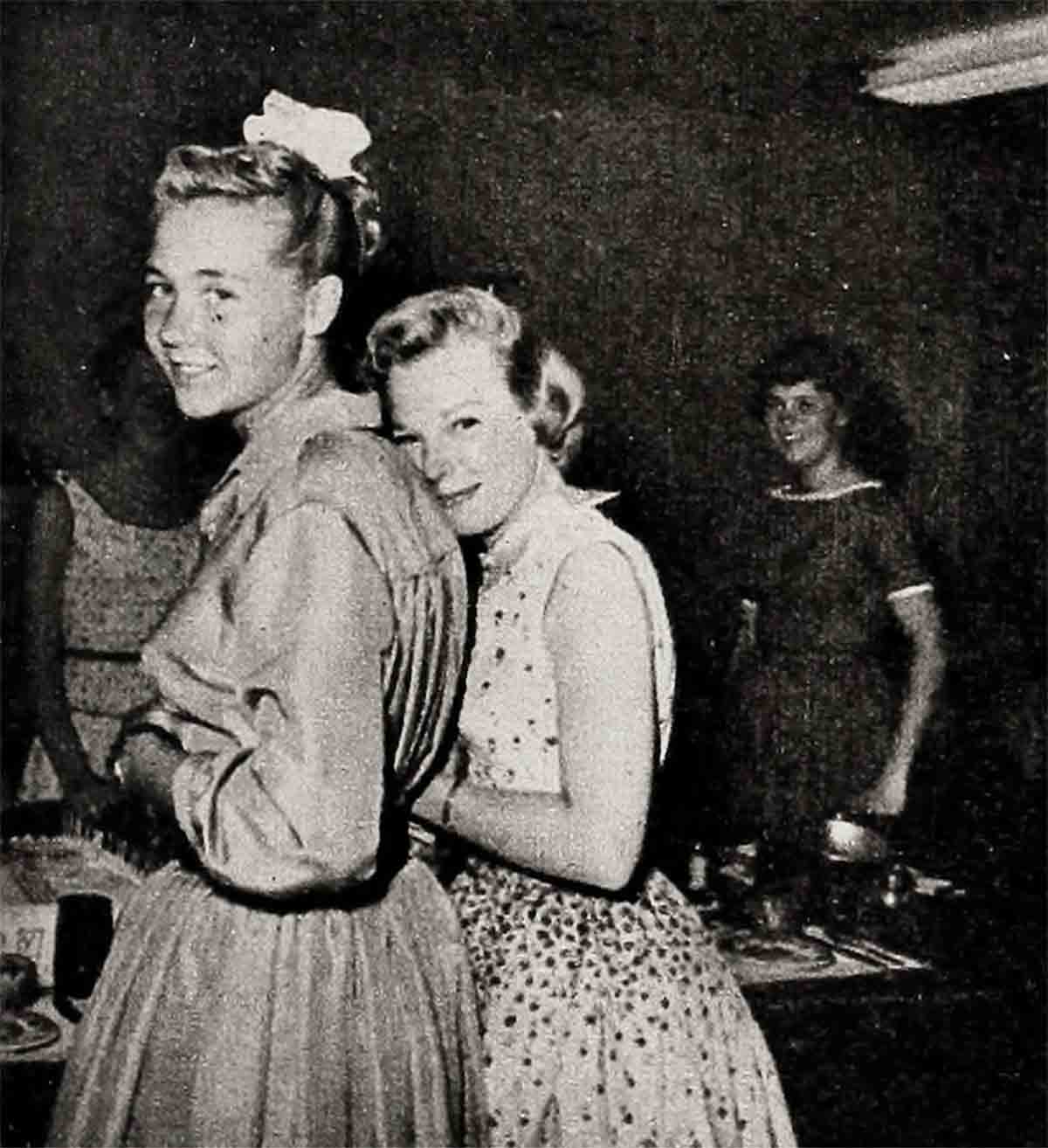
The production crew had warned her that a cloudburst was in the offing and the roads would be impassable. But June went ahead, anyway. While she was there, a bridge was washed out and she couldn’t get back to the motel for hours.
When news of her many family activities waited back to Hollywood, some local observers, jaded and skeptical, found the news difficult to believe. Perhaps they didn’t want to believe that June, in the most trying of circumstances, was a model wife. For months they had been whispering that “there’s trouble in the Powell-Allyson household.”
This rumor began several months ago when June and Dick were out to dinner with friends. The Powells began to quarrel. June (who is so emotional she cries at card tricks) jumped up from her seat, ran out, and hailed a cab.
Next day Hollywood was whispering that the Powell-Allyson marriage had turned sour. Said one know-it-all: “It figures. Let’s face it. They’ve been married nine years. That’s par for the course,”
Said others: “She’s just tired of playing Trilby . . . Two careers in one family just don’t mix . . . I never expected it to last!”
June was disturbed by these rumors.
“Richard and I quarreled,” she admitted. “So what? All married couples have disagreements. It was nothing important. It’s over and done with.”
Yet June was deeply hurt. She couldn’t understand why people were ready to write off her nine years of marriage.
Didn’t they understand that she and Richard had been through so much together, they had become inseparable parts of each other’s lives?
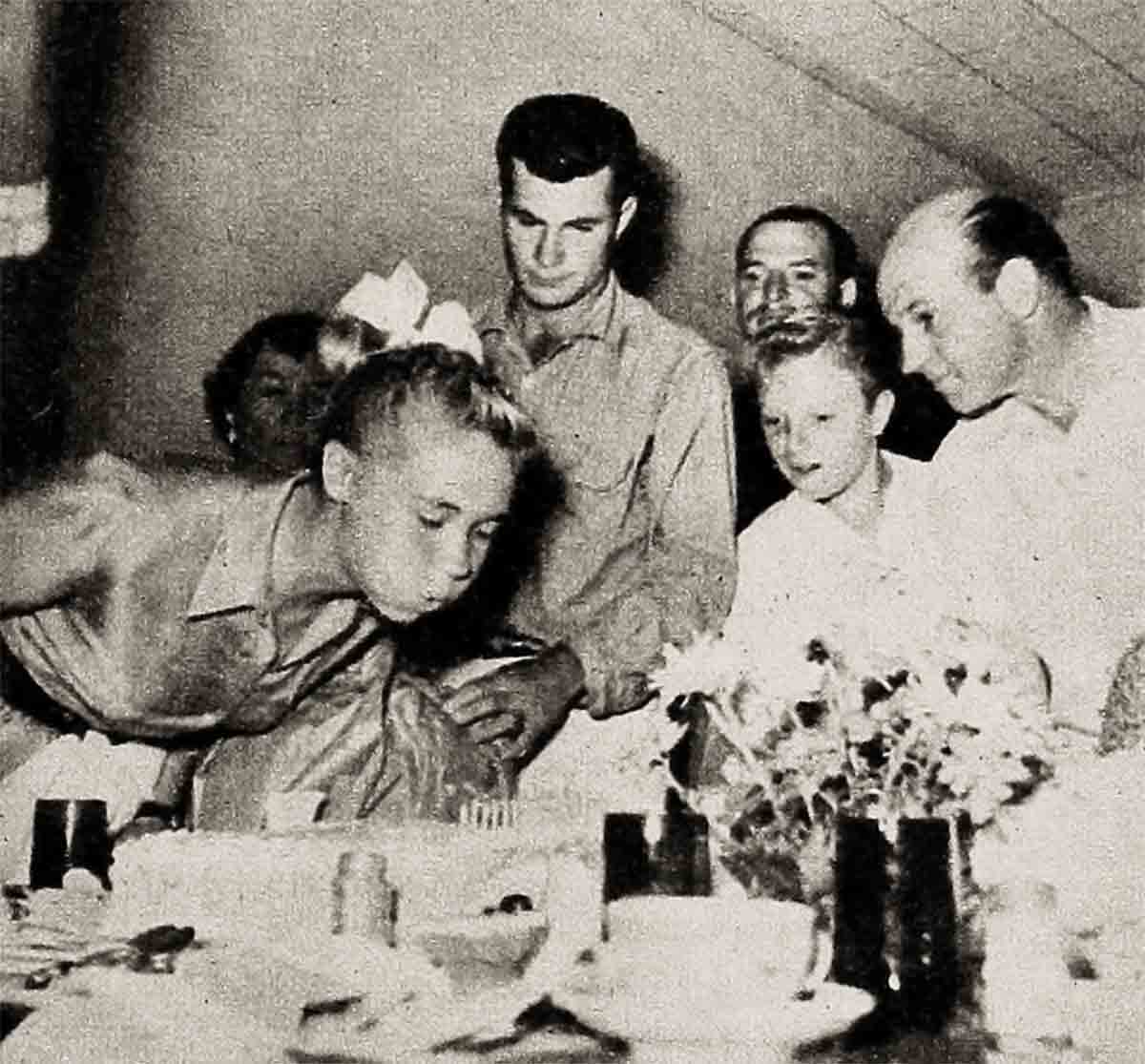
Didn’t they realize that only a few months before she had come close to losing her husband on the operating table?
“I’ll never forget it,” she says, “so long as I live. It happened last winter just before I started the Glenn Millerjob. Richard got up in the middle of the night. He thought he was suffering from indigestion. He took some bicarbonate of soda and went back to bed. Then he took a little brandy. But that didn’t help either.
“When morning came I called a doctor. By then the pain had spread all over his stomach and his skin was red and I was really frightened.
“The doctor said it was just a virus and told me not to worry. He gave Richard some sedatives and told; me everything would be fine. Only Richard’s pain got worse and worse and he was in agony for the next three days.
“I stayed with him all the time but on the third night I just couldn’t keep my eyes open any longer. I fell asleep right on top of the bedspread and when I awoke, Richard was sitting on my bed and water was running down his face and I remember saying to myself in a daze, ‘That’s funny. Why is he taking a shower at this time of the night?’ And as I tried to shake the sleep out of my eyes, Richard mumbled, ‘Help me, June. Please help me.’ And then he collapsed in a heap at the foot of the bed.
“I don’t know how I managed but I dragged him to the bed, and it was then that his appendix burst. We rushed him to the hospital for an emergency operation. Richard is allergic to penicillin, so they couldn’t use that to kill the infection and it began to spread through his system.
“Then the terrible mental torture began. Suppose he dies, I asked myself. What will I do? How will I ever be able to tell Ricky or Pam?
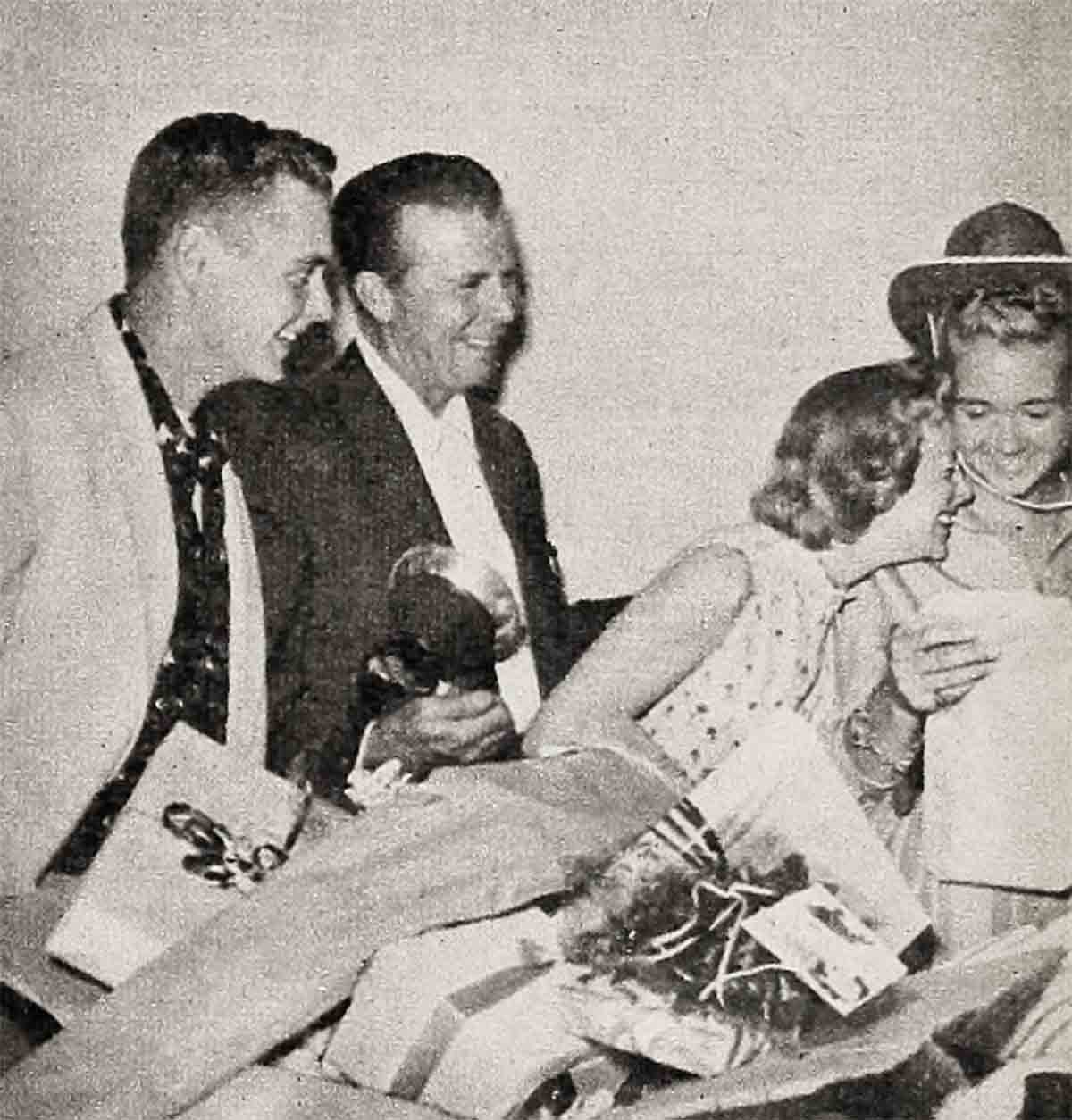
“And Richard was dying. There was no doubt about it. Another operation was necessary. They were giving him blood transfusions and feeding him intravenously and it looked like the end for sure.
“A priest went into Richard’s room and then walked out to me and said, ‘You’d better go in, Mrs. Powell.’
“And I can’t tell you how I felt when I walked in and saw Richard on that bed, almost lifeless. I began to talk to him, telling him that he must live, must live. I don’t know what I said. But after a while his eyes opened ever so slowly and he mumbled, ‘This is a helluva way to quit smoking. Isn’t it, June?’ And once he said that I knew he’d pull through.”
Such experiences bind a man and wife together and to June it’s incredible that anyone might think a picayune quarrel could nullify such love as theirs.
To others it is not incredible at all. A prominent director, for example, who has known the Powells for years, says, “The reason many Hollywood people expected June’s marriage to fail is relatively simple. At the time of their marriage, Junie had nothing in common with Dick except a show business background. She was twenty years younger than he—naive, insecure and incapable of helping him socially, domestically or professionally.
“She couldn’t sail, couldn’t play tennis or golf, didn’t know how to run a house, was wracked by an inferiority complex, stammered when speaking to the servants. In short she was a New York City kid who had been raised in poverty.
“Her acting career, however, was going great guns, and Dick’s was not. The wise guys thought that sooner or later jealousy would ruin the marriage. They didn’t understand that June and Dick are intelligent and have great strength of character.
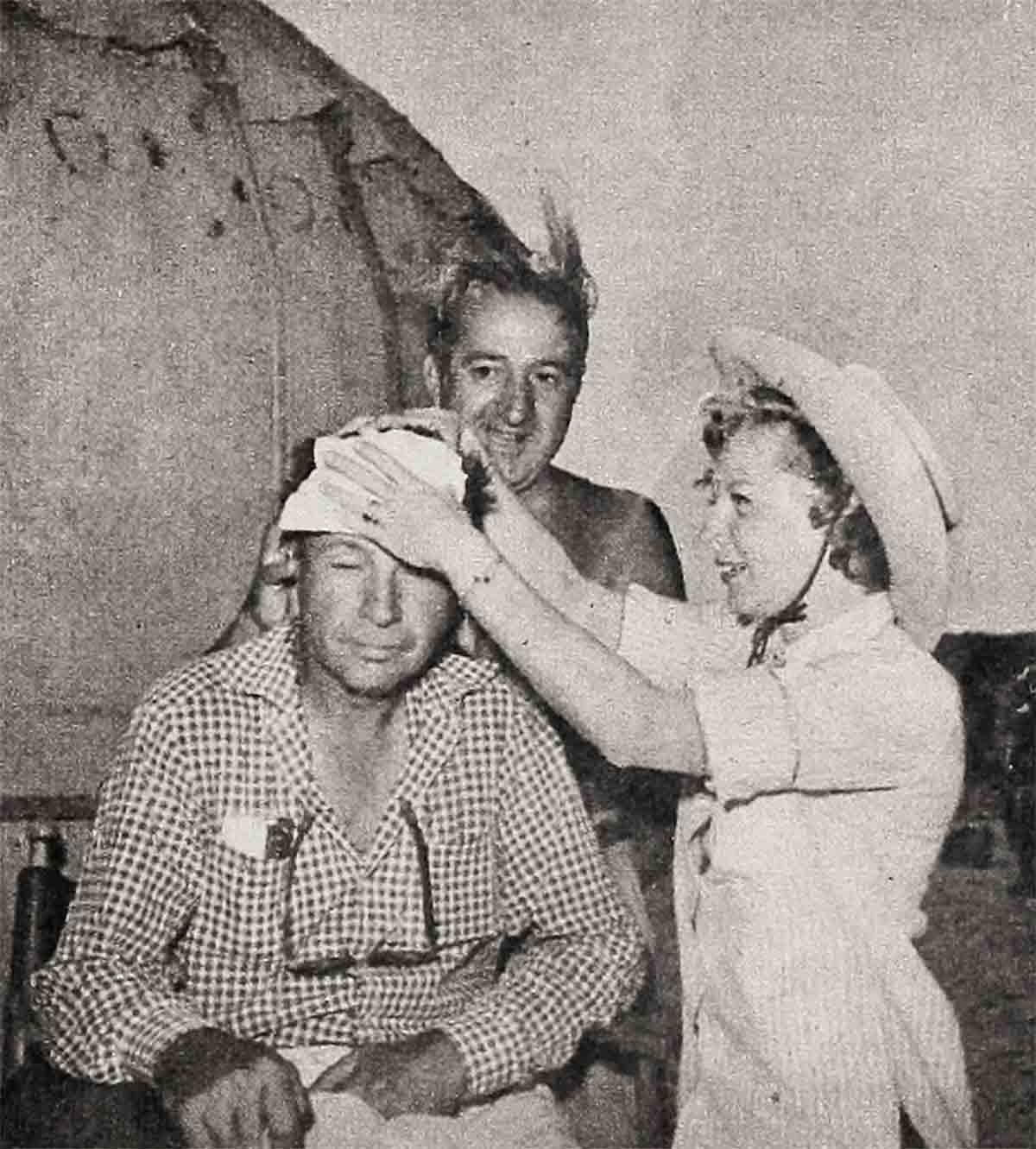
“In the years he’s been married to Junie, Dick has taught her a great deal. He still chooses scripts for her, and she still abides by his decisions, because they are wise decisions born of extensive experience.
“Some actresses resent their husbands’ counsel. Not June. She respects Dick and loves him for all he’s done. And in the dark days several years ago when his career seemed to have slumped, she always maintained great faith in his ability.
“That faith has paid off. Today Dick Powell is one of the biggest men in Hollywood. He owns a TV series, Four Star Playhouse, produced by Powell Enterprises and sponsored by Singer Sewing Machine. He alternates with three other top names, Charles Boyer, David Niven and Ronald Colman.
“Dick is one of Howard Hughes’ favorites at RKO. Hughes signed him as a director in 1952 and Dick did an excellent directorial job on Split Second. Last year Hughes made him a producer and this year Dick is not only directing and producing but he’s just finished starring with Debbie Reynolds in Susan Slept Here.
“June’s career is in high, too. The Glenn Miller Story is one of the big money makers of the year, and she has just signed a share-the-profits deal with Alan Ladd. Under the circumstances, it seems impossible that career problems could cause Dick and June to split up—and unlikely that anything else could.
“But the rumors persist because people don’t realize how much Junie has changed in the last ten years. They think she is the same clinging, bewildered kid who married Powell in 1945 and that Powell is envious of her success. Or that she is currently resenting his guidance.”
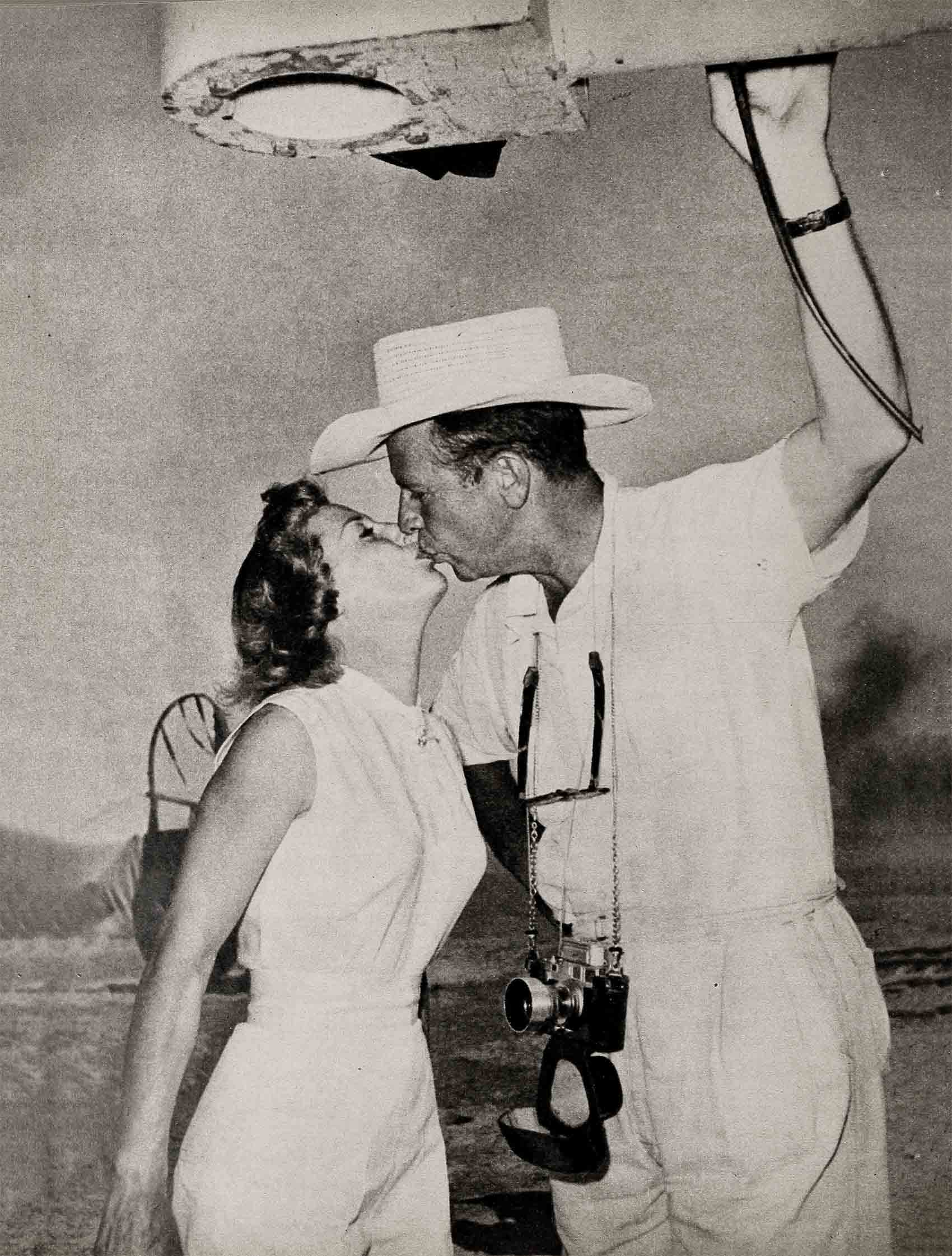
Powell says, “Who has time to deny silly rumors? I’m too busy making a picture.”
In St. George, June said. “Dick and I have never been happier. It just hurts me to see him working so hard. Every night after the day’s shooting he holds long conferences with his staff. He’s really a very fine director. I’m sure this picture will prove it.
“The reason I’m out here with Richard is because I love him and want to be near him. I was away from him during the shooting of Strategic Air Command. And I don’t like being away from him.”
That does not sound like two people on the verge of separation. Of course, conditions might change but this isn’t very likely. Ever since Dick married June, he’s had eyes for no one else. No matter how gauche she was, he never strayed, never grew angry, never got fed up. And as June says, “It began to penetrate my thick skull years ago that Richard loved me for myself. And when I became sure of that I began to grow up.”
June was wise enough to ask for children to solidify the marriage.
At first Dick was chary of adopting children. (He had two by his previous marriage to Joan Blondell). But only because he wasn’t at all sure that June could handle children.
In 1949, when Joan Crawford told the Powells about an adoption home in Memphis, Tennessee, they adopted their daughter Pamela from there.
Two years later on her way back to Memphis to adopt a brother for Pam, June found that adoption wouldn’t be necessary. She gave birth to Richard Keith on Christmas Eve that year.
It has surprised many people, but June turned out to be a model mother thereby winning her husband’s lasting respect.
When Dick married June she had relatively few friends in Hollywood. He introduced her to his own world, a conservative world of prominent, wealthy, influential people. June had to do some drastic adapting, and while she made many errors at first, she gradually learned to feel at home with all kinds of people.
During this adaptation, she dropped the chorus girls she had known and grown up with in New York (Betsy Kelly, Gene’s wife, and Jane Ball, Monte Prosser’s wife) largely because they rarely crossed her path, but partly because she did not feel capable of mixing the two worlds.
Last year after ten years in Hollywood, June seemed to have conquered her inferiority complex.
She refused to sign with MGM again and struck out on her own, fully confident that she would do well. And she has.
She hired a secretary who once worked in the Copacabana chorus line, even as June had.
Simultaneously she became the mistress of a vast new estate in Mandeville Canyon, refurbishing the place and supervising it with dispatch and precision.
There were suggestions, of course, that she was revolting from Powell’s domination, asserting her own personality at last. But actually June’s real personality never has been submerged. It has been merely in the process of development. It has taken June a long time to get over her fear of assuming responsibility. Now June is sure of her own values and does not hesitate to act on them.
“In my book,” she said a few weeks ago, “Richard’s happiness and the happiness of our family come first. If there’s any time left, I’ll think about my career.
So long as cute little Junie adheres to that program, Mr. and Mrs. Richard Powell are destined to go on with many years of domestic bliss.
THE END
—BY ALICE HOFFMAN
It is a quote. MODERN SCREEN MAGAZINE OCTOBER 1954




